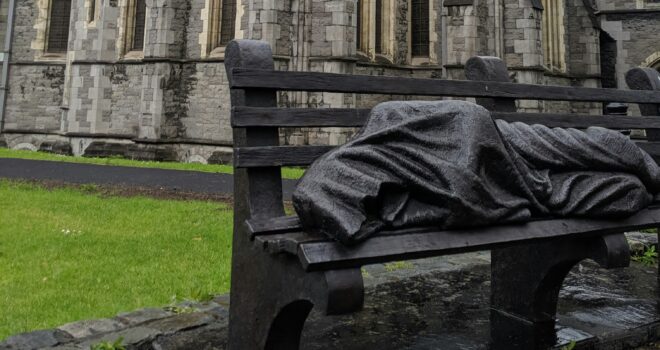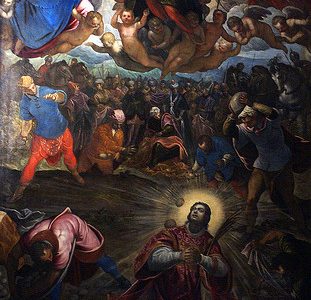Homelessness is a growing crisis in the United States, with over 580,000 people experiencing homelessness on any given night, according to Notre Dame’s Lab for Economic Opportunity. Rising housing costs, mental health challenges, and systemic poverty have left countless individuals and families vulnerable. Yet, in the face of this daunting reality, the Catholic Church offers a unique and deeply compassionate response, rooted in the Gospel and embodied through organizations like the Society of St. Vincent de Paul (SVdP).
Michael Acaldo, the newly appointed CEO of SVdP USA, has dedicated more than 30 years to addressing homelessness. His leadership reflects the Society’s longstanding mission to meet people where they are and prevent homelessness before it begins. Drawing on his faith and decades of service, Acaldo views homelessness not merely as a social issue but as a profound call to live out Christ’s command to love one another.
A Catholic Framework for Addressing Homelessness
The Catholic perspective on homelessness begins with recognizing the inherent dignity of every person. This principle, articulated by theologians such as St. Thomas Aquinas, stems from the belief that all humans are made in the image and likeness of God. As St. Vincent de Paul himself said, “Go to the poor: you will find God.”
For Catholics, the solution to homelessness must go beyond providing temporary relief. It involves affirming the dignity of those in need through compassion, community, and long-term support. Pope Francis has frequently urged Catholics to see the face of Christ in the poor, reminding us in Evangelii Gaudium that “the worst discrimination which the poor suffer is the lack of spiritual care.” This insight underscores the dual nature of Catholic service: addressing both material and spiritual needs.
SVdP’s Mission: Prevention and Compassion
At the heart of SVdP’s approach is homelessness prevention. Michael Acaldo emphasized the importance of early intervention: “When someone becomes homeless, it’s much harder to help them out of that cycle. But a little investment—a rent payment, utility assistance, or a hot meal—can turn the tide before a crisis spirals out of control.”
SVdP’s Home Visit program is a cornerstone of this mission. Volunteers, known as Vincentians, visit individuals and families in their homes to assess their needs and provide personalized support. This model, established nearly 180 years ago, is a powerful example of Pope St. John Paul II’s teaching in Sollicitudo Rei Socialis: “Solidarity is not a feeling of vague compassion or shallow distress at the misfortunes of so many people, both near and far. On the contrary, it is a firm and persevering determination to commit oneself to the common good.”
Through their work, Vincentians often uncover hidden struggles, such as families without enough food, children sleeping on floors, or individuals unable to afford medical care. Each encounter is an opportunity to restore dignity and stability. As Acaldo put it, “Every person is a person. They’re not an object; they have their own story. And we meet them where they are.”
The Role of Faith in Action
For SVdP, addressing homelessness is not just about social service—it is a spiritual mission. “We’re a spiritual organization first,” Acaldo explained. “Our work is rooted in love and the Gospel call to see the face of Christ in those we serve.” This spiritual foundation inspires Vincentians to approach each person with humility, accountability, and hope.
One of SVdP’s most moving traditions is beginning home visits with prayer. Often, the individuals being served lead these prayers, expressing a profound faith that transcends their circumstances. Acaldo shared how one person, on the brink of eviction, prayed, “Lord, I knew You would send help.” Such moments reveal the deep connection between service and evangelization, a concept echoed by St. Teresa of Calcutta: “If you can’t feed a hundred people, then feed just one.”
A Broader Catholic Response
The Catholic Church’s response to homelessness also involves advocating for systemic change. Acaldo highlighted the need for policies that address rising housing costs, mental health care, and disability support. He emphasized that preventing homelessness is not only compassionate but cost-effective, saving society money while preserving the dignity of individuals and families.
In addition to advocacy, the Church encourages simple acts of charity. Many Vincentians carry small care packages in their cars—water bottles, granola bars, and information on local shelters—to offer immediate aid to those on the street. As Acaldo explained, “The smallest gestures can make a world of difference. A bottle of water or a kind word can remind someone of their worth.”
Stories of Transformation
SVdP’s impact is best illustrated through the lives it touches. Acaldo recalled the story of a man in Baton Rouge who, on Christmas Day, asked to call his mother in Minnesota. Homeless and alone, the simple act of reconnecting with his family brought him to tears. “It was like giving him a million dollars,” Acaldo said. Another story involved a legally blind British citizen stranded in Louisiana after a hurricane. With SVdP’s help, he was reunited with his family in Great Britain, a testament to the organization’s commitment to seeing every case through.
A Call to Action
The Catholic Church invites everyone to participate in the mission of serving the poor. Acaldo urged readers to visit svdpusa.org to find local councils, volunteer opportunities, and resources for starting new SVdP chapters. He also encouraged Catholics to pray for those in need and for the volunteers who serve them.
As Pope Benedict XVI wrote in Deus Caritas Est, “Love of neighbor . . . consists in the very fact that, in God and with God, I love even the person whom I do not like or even know.” This love, embodied by SVdP, transforms not only those who are served but also those who serve.
Conclusion
Homelessness is a profound challenge, but the Catholic approach—rooted in compassion, prevention, and spiritual care—offers hope. Through organizations like SVdP, the Church continues to be a beacon of light for those in the darkness of poverty. By responding to Christ’s call in Matthew 25, we can help ensure that every person has not just a roof over their head but the dignity and hope that come from being truly seen and loved.
Photo by Randall Greene on Unsplash














